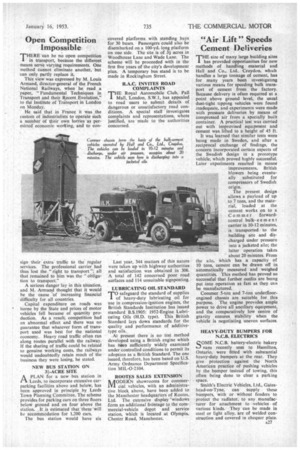Open Competition Impossible
Page 113

If you've noticed an error in this article please click here to report it so we can fix it.
THERE can be no open competition
in transport, because the different means serve varying requirements. One method Cannot eliminate another, but can only partly replace it.
This view was expressed by M. Louis Armand, director-general of the French National Railways, when he read a paper, "Fundamental Techniques in Transport and their Recent Evolution," to the Institute of Transport in London on Monday.
He said that in France it was the custom of industrialists to operate such a number of their own lorries as permitted economic working, and to con sign 'their extra' traffic to the regular services. The professional carrier had thus lost the "right to transport"; all that remained to him was the "Obligation to transport."
A serious danger lay in this situation, and M. Armand thought that it would be the cause of increasing financial difficulty for all countries.
Capital expenditure on roads was borne by the State and prices of motor vehicles fell because of quantity production. As a result, competition had an abnormal effect and there was no guarantee that whatever form of transport used was best for the national economy. Heavy road traffic often ran along routes parallel with the railway. If the sharing of traffic could be related to genuine working costs, the railways would undoubtedly retain much of the business they were losing, he stated.
NEW BUS STATION ON 31-.ACRE SITE
A PLAN for a new bus station in (-I Leeds, to incorporate extensive carparking facilities above and below, has been approved in principle by Leeds Town Planning Committee. The scheme provides for parking cars on three floors below ground and on four above the station.' It is estimated that there will be accommodation for 1,200 cars.
The bus station would have six covered platforms with standing bays for 30 buses. Passengers could also be disembarked on a 100-yd. long platform on one side The site is of 3i acres in Woodhouse Lane and Wade Lane. The scheme will be proceeded with in the first five years of the city's development plan. A temporary bus stand is to be made in Rockingham Street.
RA.C. INVITES ROAD COMPLAINTS
THE Royal Automobile Club, Pall Mall, London, S.W.1, has appealed to road users to submit details of dangerous or unsatisfactory road conditions. A special staff investigates complaints and representations, where justified, are • made to the authorities concerned.
Last year, 344 matters of this nature were taken up with highway authorities and satisfaction was obtained in 306. A total of 142 concerned poor road surfaces and 114 unsuitable sign posting.
LUBRICATING OIL STANDARD
TO safeguard the standard of supplies of heavy-duty lubricating oil for use in compression-ignition engines, the British Standards Institution has issued standard B.S.1905: 1952-Engine Lubricating Oils (H.D. type). This British Standard lays down standards for the quality and performance of additivetype oils.
At present there is no test method developed using a British engine which has been sufficiently widely examined under controlled conditions to permit its adoption as a British Standard. The one issued, therefore, has been based on U.S. Army Ordnance Department Specification MIL-0-2104.
ROOTES SALES EXTENSION TUODERN showrooms for commerivi cial vehicles, with an administrative block above, have been added to the Manchester headquarters of Rootes, Ltd. The extensive display "'windows form an additional frontage to,the commercial-vehicle depot and service station, which is located at Olympia, Chester Road, Manchester.












































































































































































